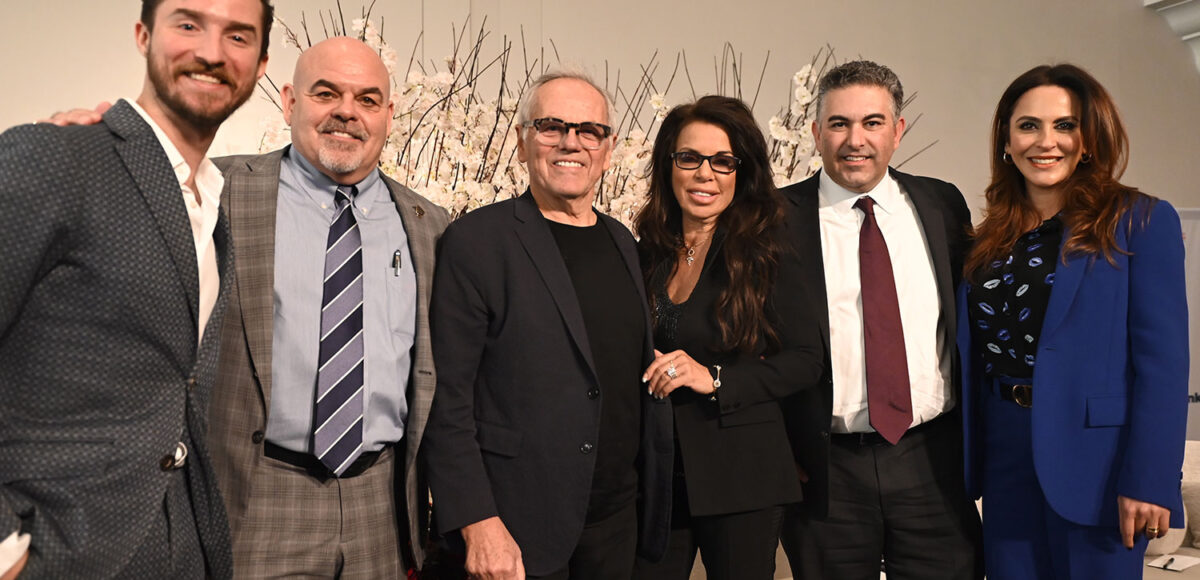Renowned celebrity chef and restaurateur Wolfgang Puck joined Ann Shatilla for her annual State of Luxury Power Panel Series at The Maybourne Beverly Hills on Nov. 7. The panel offered insight for companies looking to elevate their luxury branding for the new year with different PR and marketing techniques with exclusive input from
Puck, who has years of experience in the restaurant industry.
Attendees enjoyed breakfast and networking before the panel discussion and a Q&A with the panelists.
For the past 10 years, Shatilla, an Emmy Award-winning news producer, has moderated the State of Luxury Power Panel Series, which is organized with the Beverly Hills
Chamber of Commerce. The panel teaches businesses how to increase and execute luxury PR and growth techniques for the upcoming year.
“This is one of the events where I am always amazed that hardly anyone is looking at their phone during the program,” said Beverly Hills Chamber of Commerce President and CEO Todd Johnson. “You’re going to learn a lot from the speakers here who are extremely well known.”
Puck was also joined by his son, Byron Lazaroff-Puck, who serves as the Director of Food, Beverage, and Hospitality at the Wolfgang Puck Fine Dining Group. Additionally, Matt Goldberg offered advice to attendees for pitching their businesses to the media, with his insight serving as Vice President and News Director of KCBS and KCAL.
Puck elaborated on his experience in hospitality and fine dining, offering attendees a window into his philosophies for successfully operating luxury businesses, such as his restaurant Spago on Canon Drive in Beverly Hills, which also has several locations worldwide.
Puck’s secret to luxury is focusing on the luxury business experience and how patrons feel after visiting.
“Make people feel special; make them feel like they can’t wait to come back to your restaurant. You don’t want to go back if you don’t have a great experience. It’s all about the experience,” said Puck. “Treat the customers like your family.”
Shatilla expounded on the idea of experience by putting an emphasis on properly training employees and providing them with the necessary tools during the onboarding process to make sure that philosophy gets passed down to staff at every level.
“Train, retrain, continue to tell them that these are the standards of luxury. If we’re charging this, and we’re operating this service, we must make sure that every time we answer the phone, send an email, whatever it is, it is consistent,” Shatilla argued.
According to Shatilla, luxury is defined by six key elements: exceptional quality, exclusivity, high social status, the use of premium materials in manufacturing and design, strong consumer desire and superior level of service.
On “the level of service” as a defining aspect of luxury, Puck gave the example of “anticipating to get the customers what they want before they actually know.” At Spago, longtime maître d’ and sommelier Bernard Erpicum devoted time to learning the personal preferences of their frequent patrons, such as their favorite drink or preferred table locations.
But this, Shatilla argued, ultimately comes down to how employees are trained and empowered by their managers to provide the best experience possible for patrons.
Shatilla invited Lazaroff-Puck to share his managerial expertise on recruiting and training the right employees.
“Look for people that have that spark— someone that is truly passionate and adores what they do,” said Lazaroff-Puck.
Lazaroff-Puck urged business owners to “hire people who want to be of service.” He described his philosophy of “managing up,”
which he defines as the process of “building someone up to the person/professional that he thinks they can be.”
“It’s about the training and the onboarding that allows that [longevity] to keep going,” said Lazaroff-Puck.
Looking back on nearly four decades of operating his wildly successful Spago restaurant, Puck reflected on what he’s learned as a pioneer in defining modern fine dining. He stressed curiosity as one of the main drivers of success, especially in the face of burgeoning technologies fastidiously changing the way businesses operate and market themselves.
“We can always learn from the young people,” Puck stated. “I learn from my youngest boy about technology and vice versa; he learns from my experience.”
Lazaroff-Puck added that Spago has upgraded its reservation system by allowing patrons to book online. But for patrons who still like to make reservations the old-fashioned way, Spago allows patrons to book over the phone using a robocall service, which is an automated voice system that handles calls that saves Spago nearly 10 hours a week. This system allows Spago to adapt to new technologies while also “meeting guests where they’re at,” especially if they prefer to make reservations over the phone.
Finally, Goldberg offered advice to business owners looking to market their businesses via the press. His answer? “Stories,” Goldberg said.
Knowing your business’ “why” is key to honing your stories and making them of interest to reporters, argued Goldberg. Additionally, he stated that understanding what and to whom you’re pitching your business and identifying the business’ relevancy to the community will help with navigating the media landscape.
Goldberg urged business owners to consistently read the news and to try and tie their business mission to existing stories reported on in the media. He gave the example of instances of retail theft in Beverly Hills over the past couple of months, and how security companies can use that as a hook to introduce their business.
Finally, Goldberg told business owners that “doing good” and promoting something unique will pique assignment editors’ interest. Puck gave his example of Spago hosting, for the first time, a luxury barbecue brunch on Nov. 10, which was driven by Puck’s desire to allow patrons to experience something different and would “make them feel good.” In addition, a portion of the proceeds will support the Dream for Future Africa Foundation, which was founded by Puck’s wife, Gelila Assefa Puck.
Attendees left the Maybourne armed with strategies from industry leaders on building and maintaining successful luxury brands in today’s competitive market.







